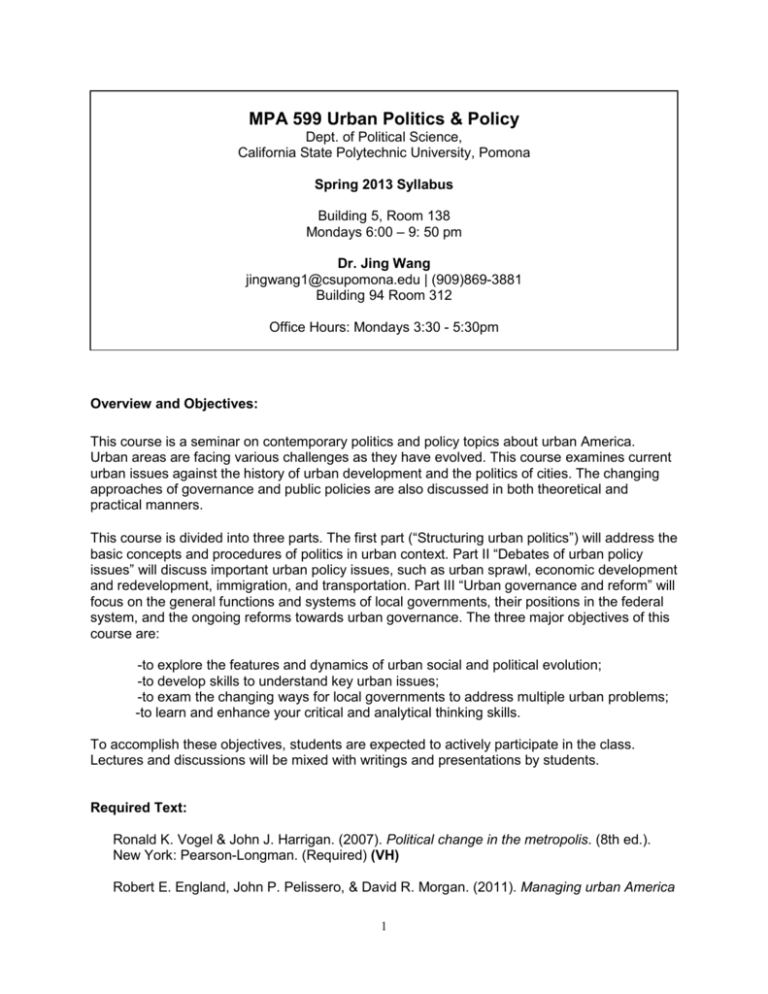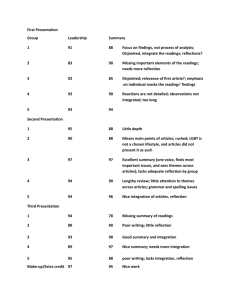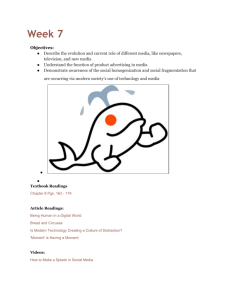
MPA 599 Urban Politics & Policy
Dept. of Political Science,
California State Polytechnic University, Pomona
Spring 2013 Syllabus
Building 5, Room 138
Mondays 6:00 – 9: 50 pm
Dr. Jing Wang
jingwang1@csupomona.edu | (909)869-3881
Building 94 Room 312
Office Hours: Mondays 3:30 - 5:30pm
Overview and Objectives:
This course is a seminar on contemporary politics and policy topics about urban America.
Urban areas are facing various challenges as they have evolved. This course examines current
urban issues against the history of urban development and the politics of cities. The changing
approaches of governance and public policies are also discussed in both theoretical and
practical manners.
This course is divided into three parts. The first part (“Structuring urban politics”) will address the
basic concepts and procedures of politics in urban context. Part II “Debates of urban policy
issues” will discuss important urban policy issues, such as urban sprawl, economic development
and redevelopment, immigration, and transportation. Part III “Urban governance and reform” will
focus on the general functions and systems of local governments, their positions in the federal
system, and the ongoing reforms towards urban governance. The three major objectives of this
course are:
-to explore the features and dynamics of urban social and political evolution;
-to develop skills to understand key urban issues;
-to exam the changing ways for local governments to address multiple urban problems;
-to learn and enhance your critical and analytical thinking skills.
To accomplish these objectives, students are expected to actively participate in the class.
Lectures and discussions will be mixed with writings and presentations by students.
Required Text:
Ronald K. Vogel & John J. Harrigan. (2007). Political change in the metropolis. (8th ed.).
New York: Pearson-Longman. (Required) (VH)
Robert E. England, John P. Pelissero, & David R. Morgan. (2011). Managing urban America
1
(7th ed.). Washington: CQ Press. (Optional) (EPM)
In addition to the text, other readings, documents, and lecture slides will be provided on the
course Blackboard (BB).
Blackboard:
Blackboard will be our primary source for online communication. It will be used to post
announcements, course materials (PowerPoint lecture slides, and supplementary readings),
assignments and grades. Students will submit their assignments and other works to Blackboard
before the deadlines. All registered students should be able to access the Blackboard at
https://blackboard.csupomona.edu/.
Assignments & Grading:
Final grades will be determined on the following scale. Any “curving” of grades, if necessary –
and it usually is not – will be done only after calculating the overall scores for the entire course,
not for individual tests. No individual extra-credit “deals” will be negotiated.
Current event presentation
Discussion leader
Three reading reflection papers
“Urban facts” report & presentation
Group paper & presentation
Class participation
10%
5%
3 x 10% =30%
20%
20%
15%
Equivalence Definition:
A 93-100%
A- 90-92%
B+ 87-89%
B 84-86%
B- 80-83%
C 70-79%
D 60-69%
F
0-59% Failure
Current event presentation (10%)
We will have one of you each week to present a current event article (not earlier than 2012)
related to urban politics and policy topics. They should be articles, op-ed pieces, or analysis
from a websites, newspapers or magazines. A question to lead the class discussion is also
required.
Three reflection papers (3 X 10% = 30%)
You have the options of writing reflection papers on 3 out of the 6 sets of non-textbook readings
(see those with “*” on the schedule). These reflection papers should include your thoughts and
any analysis that you have of the readings prior to our classroom discussion. Each paper should
be 2-3 pages.
2
Discussion leader (5%)
We will have class time to discuss most of the non-textbook readings. Each of you will provide a
“discussion starter” for the class based on the reading material(s) being assigned to you. A signup sheet will be passed around on the first day of class, and you can select the reading
material(s) and the day you wish to present.
“Urban facts” report & presentation (20%)
Each of you will choose a section of the policy issues in the Brooking’s report “The state of
metropolitan America.” For certain policy issue, you will first summarize the findings in the
report, and then do your own data collecting on a specific city or metropolitan area. You should
compare the “facts” of your city to national situation in Brooking’s report, and give some
explanations and policy suggestions. You’ll present it on Apr 29, and the paper (3-5 pages) is
due on May 6.
Group paper & presentation (20%)
In groups of two, you will identify a city or a metropolitan area within the U.S. and focus on its
specific urban crisis(es) or challenge(s). You are expected to apply the related models and
theories presented in this class (if any) to your analysis, and give policy suggestions. You’ll
present in groups on June 3, and the paper (6 -12 pages) is due on June 10.
Class participation (15%)
This is a seminar involving many in-class discussions, team works, and presentations. Students
are expected to attend every class and participate in class activities. You will not be able to
receive an A in the class without meeting this requirement.
* More details of the assignments will be explained in class and also on Blackboard. All the work
should be double-spaced, using 12-point font and standard 1-inch margins. For the essays, it
should adhere to APA (American Psychological Association) style. A brief guide to APA style
can be found at http://www.writing-with-confidence.org/apastyle.html.
Class Policies:
Academic integrity:
Cheating and plagiarism are intolerable and the appropriate disciplinary penalty will be
followed. Please check the following web site for illustrations of plagiarism and common
mistakes that students make.
http://dsa.csupomona.edu/judicialaffairs/academicintegrity.asp
Violations of academic integrity will result in an F on the assignment and/or the course,
and their cases will be reported to Judicial Affairs. You are responsible for reviewing and
complying with all the University policies. Please find more information at
http://dsa.csupomona.edu/judicialaffairs/
Late work policy:
It is your responsibility to meet the assignment deadlines as specified in the course
schedule. Computer-related problems (i.e., “my email isn’t working” or “My computer is
down”) are NOT acceptable excuses. For each 24 hours late from the due time, 20% will
be deducted from your original score, unless you have documented excuse, e.g. doctor’s
note, and police report, and death certificate. Contact me by email ASAP if you have an
emergency that will require delayed work.
3
Course Schedule:
Date
Topics & Readings
Assignments
Part I. Structuring urban politics
Apr 8
Introduction to the course;
The evolution of urban America
- VH: 1
- Fishman. (1999). “The American metropolis at century's end: Past
and future influences.”
Apr 15
The evolution of urban America (cont’d);
Urban politics: diversity, political machines, & change
Reflection
paper 1 due
- VH: 3, 4 & 5
- *Mohl & Betten. (1970). “The history of urban America: An
interpretive framework.”
- *Saltzstein. (2003). “A cacophony of change: the American city
1970-2000.”
Apr 22
Urban “regimes” & Community power
Reflection
paper 2 due
- VH: 7
- *Davidoff. (1990). “Advocacy and pluralism in planning”
- *Davis. (1992). “Fortress Los Angeles: The militarization of
challenge of conceptualization,”
- *Mossberger & Stoker. (2001). “The evolution of urban regime
theory: The urban space.”
Part II. Debates of urban policy issues
Apr 29
The state of urban America: the urban policy issues
- EPM: 1 (p.2-5);
- Frey, et al. (2010). “State of metropolitan America: On the front
lines of demographic transformation.”
“Urban facts” presentations
May 6
Urban growth, sprawl & suburban development
- VH: 2 & 8;
- *Lang. (2000). “Did Neighborhood Life-Cycle Theory cause urban
decline?”
- *Gordon & Richardson. (2000). “Critiquing sprawl’s critics”
4
“Urban facts”
report due.
May 13
Urban Economic development & redevelopment
(Guest Speaker: Rick Zimmer)
Reflection
paper 3 due
- VH: 6;
- *Glasgow, et al.. (2012).“Local development policies and the
foreclosure crisis in California”
- Chapin. (2004). “Sports facilities as urban redevelopment
catalysts”
Part III. Urban governance and reform
May 20
Local government & Urban policy making
Reflection
paper 4 due
- VH: 7 (p.193-200);
- EPM:3 & 4;
- *Mullin, Peale, & Cain. (2004). “City Caesars? Institutional
structure and mayoral success in three California cities.”
- *Svara.(1987). “Dichotomy & Duality: Reconceptualizing the
relationship between policy and administration in Council-Manager
cities.”
May 29
National urban policy & Intergovernmental relations
Reflection
paper 5 due
- VH: 11;
- *Sapotichne.(2010). “The Evolution of National Urban Policy
Congressional Agendas, Presidential Power, and Public Opinion.”
- *PPIC. (2011). “Rethinking the State-Local Relationship: Local
economic development.”
- Murphy. (2011). “Obama's Urban Policy: Slow Start. Sustainable
Finish?”
Jun 3
New regionalism & Regional collaboration
Reflection
paper 6 due
- VH: 10
- *Weaver, et al. (2000). “Multilevel governance and metropolitan
regionalism in the USA”
- *Savitch, et al. (2000). “Path to New regionalism”
Final presentations
Jun 10
Final week!
Final paper
due.
5





